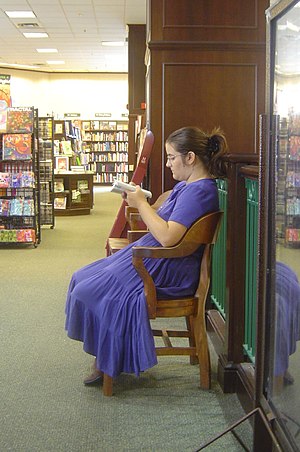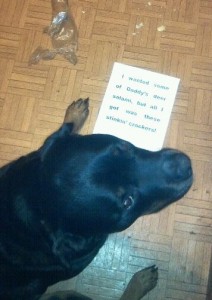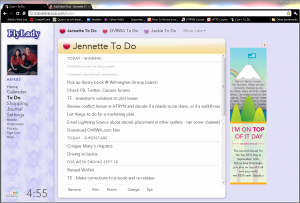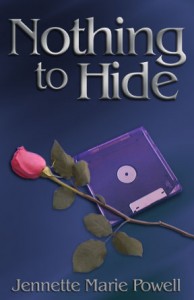I have a confession to make: I am not overly fond of big parties.
This is especially true if the majority of the people there are people I don’t know; more so if they’re people I don’t have a lot in common with.
Is this weird? It isn’t if you’re an introvert like me (and like most writers). But I didn’t always know that, and so, when I was reluctant to attend a big gathering, or if I wanted to leave soon after arriving, I wondered what was wrong with me.

I’d much rather do this than go to a big party! (photo credit: Wikipedia Commons, Creative Commons license)
The thing is, if you’re an introvert, spending a lot of time in large groups of people is mentally draining. (For extroverts, it’s the other way around: not being around people is draining.) The more people there who I don’t know, or don’t have much in common with, the more draining it is. I feel like I have to be “on” all the time – upbeat and friendly, even if I’m tired or don’t know what to say.
My husband is 100% my opposite in this way. He’s totally an extrovert, one of those people who never met a stranger. He can strike up a conversation with anyone, and the fact that I’m not thrilled to go to big parties where I don’t know a lot of people is something that baffles him. How could I not enjoy it? (Add to that: I don’t drink much alcohol–not because I have a problem with drinking in general, but it takes very little to make me feel really bad. So being the only sober person in a roomful of people is even less fun.)
I used to think “introverted” was synonymous with “shy.” So when I wanted to cringe at the thought of going out to a bar one more night (because when I was young and single, I didn’t have much else to do), I wondered what was wrong with me. Because the thing is, I’m not shy. Once I get to know someone, and like hanging out with them, I don’t have a hard time talking to them.
Most of the time I went anyway, because I wanted to meet people. A good thing, too, for that’s how I ended up meeting my husband–at a bar, LOL. (Yes, it happens! For the whole story, see How I Met My Husband.) It helped a great deal that I’d recently taken the Dale Carnegie Course, where most of the people were introverts, and we learned ways to strike up conversations with people we didn’t know, ways to take an interest in others.
Of course for many authors who write romance, the national conference of Romance Writers of America is nothing but one party after another. Yes, I’ve gone. A couple years ago, I went with my main goal being to meet people and have fun. And I did! That’s not to say I didn’t need some down time between events, but it wasn’t bad at all. Of course at an RWA event, there are always a question that can break the ice: “What do you write?”

Kristin Bailey/Jess Granger (middle) signs a book for a reader while Stacy McKitrick (right) and I watch.
Reader events are fun, too, with the main difference being a slight change in the guaranteed question to “What do you like to read?” I attended one of these on Saturday, a panel discussion at a branch of the Dayton Metro Library. I shared the panel with four of my RWA chapter friends, and several people in the audience also were writers. Writing is something I can always talk about! But usually, I prefer one-on-one, or small groups.
What about you – are you an introvert or extrovert, or a little of both? What kind of gatherings do you enjoy most? Have you confused “shy” with “introverted” before? Is it weird to not enjoy parties? Please tell me I’m not alone–I’d love to hear from you!
 Jennette Marie Powell writes stories about ordinary people in ordinary places, who do extraordinary things and learn that those ordinary places are anything but. In her Saturn Society novels, unwilling time travelers do what they must to make things right... and change more than they expect. You can find her books at Amazon, Barnes & Noble, Smashwords, Kobo, iTunes, and more.
Jennette Marie Powell writes stories about ordinary people in ordinary places, who do extraordinary things and learn that those ordinary places are anything but. In her Saturn Society novels, unwilling time travelers do what they must to make things right... and change more than they expect. You can find her books at Amazon, Barnes & Noble, Smashwords, Kobo, iTunes, and more.






 New Year’s Day was just like any Sunday in the winter when I was a kid, except that you couldn’t go anywhere because everything was closed. It was boring, because it was nothing but the parents sitting around watching football, which I was never into. Then the retailers started wising up, and realized not everyone was into football and there was money to be made from those of us who weren’t. Now everything’s open, so there’s shopping to do if you need or want something, and it’s less boring. Football is spread out for several days both before and after New Year’s Day, so that’s less of a Big Deal too.
New Year’s Day was just like any Sunday in the winter when I was a kid, except that you couldn’t go anywhere because everything was closed. It was boring, because it was nothing but the parents sitting around watching football, which I was never into. Then the retailers started wising up, and realized not everyone was into football and there was money to be made from those of us who weren’t. Now everything’s open, so there’s shopping to do if you need or want something, and it’s less boring. Football is spread out for several days both before and after New Year’s Day, so that’s less of a Big Deal too. The allure of this, too, escaped me for many years. Of course, the big attraction for many is drinking. I was a boring, rule-abiding teen and didn’t drink. In fact, I was usually babysitting for people with glamorous parties to attend. I didn’t even get dressed up, and I drank Coke. TV was usually boring–I never liked any of the entertainment on those New Year’s Eve shows (still don’t). New Year’s Eve got better when I met my husband, and actually had someone special to kiss at the strike of midnight, but it was still just another night at the bar. When we owned the bar for over ten years, it also meant I saw little of my husband, as he was always working, and I needed to help distribute the champagne. This was okay in and of itself, but there were always the one or two PITA patrons who either tried to scam us out of an extra bottle, or who bitched because we hadn’t gotten around to them yet (everyone always got their champagne before midnight). The best part of New Year’s Eve was having my best friend from college over–there is no such thing as a dull moment with her around, especially with alcohol! 😀 But that stopped when she found a significant other of her own, and they stayed closer to home.
The allure of this, too, escaped me for many years. Of course, the big attraction for many is drinking. I was a boring, rule-abiding teen and didn’t drink. In fact, I was usually babysitting for people with glamorous parties to attend. I didn’t even get dressed up, and I drank Coke. TV was usually boring–I never liked any of the entertainment on those New Year’s Eve shows (still don’t). New Year’s Eve got better when I met my husband, and actually had someone special to kiss at the strike of midnight, but it was still just another night at the bar. When we owned the bar for over ten years, it also meant I saw little of my husband, as he was always working, and I needed to help distribute the champagne. This was okay in and of itself, but there were always the one or two PITA patrons who either tried to scam us out of an extra bottle, or who bitched because we hadn’t gotten around to them yet (everyone always got their champagne before midnight). The best part of New Year’s Eve was having my best friend from college over–there is no such thing as a dull moment with her around, especially with alcohol! 😀 But that stopped when she found a significant other of her own, and they stayed closer to home.
 Do we have to struggle financially to sell? I don’t think so.
Do we have to struggle financially to sell? I don’t think so.

 If you were like me, and were the slowest runner in your class, you know all about this. Being the last one picked for anything in gym class. Being the only one guaranteed to strike out when forced to play softball (because yeah, when you’re as bad at it as I was, it sucked). Being the unpopular kid, the one that didn’t get invited to the cool kids’ parties. Of course now, I look back and think, I wouldn’t have enjoyed those parties anyway (talk to people I don’t know? who were all drinking when I wasn’t?). But back then, it was just being Left Out. If I were a holiday TV special, I’d be Rudolph the Red-Nosed Reindeer.
If you were like me, and were the slowest runner in your class, you know all about this. Being the last one picked for anything in gym class. Being the only one guaranteed to strike out when forced to play softball (because yeah, when you’re as bad at it as I was, it sucked). Being the unpopular kid, the one that didn’t get invited to the cool kids’ parties. Of course now, I look back and think, I wouldn’t have enjoyed those parties anyway (talk to people I don’t know? who were all drinking when I wasn’t?). But back then, it was just being Left Out. If I were a holiday TV special, I’d be Rudolph the Red-Nosed Reindeer.
 Yet for all the time she spends on the Loli forums and on Tumblr, she never comments. Ever.
Yet for all the time she spends on the Loli forums and on Tumblr, she never comments. Ever.